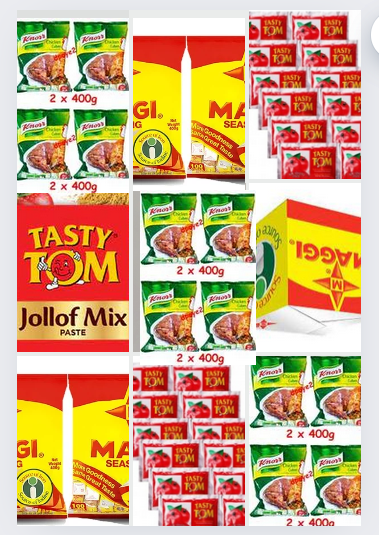By Ibidunni Banjoko
In Nigeria’s bustling and competitive seasoning market, a fierce battle for mindshare is unfolding. With a population of over 200 million, the Nigerian market offers vast opportunities for brands to capture the loyalty and taste buds of consumers. Established players and new entrants alike are employing innovative strategies to carve out their niches and dominate this lucrative sector.
Maggi and Knorr, two of the most recognized brands, have long held dominant positions in Nigeria’s seasoning market. Their extensive distribution networks, aggressive marketing campaigns, and deep-rooted brand loyalty have kept them at the forefront. Maggi, a product of Nestlé, has been a household name for decades, often synonymous with cooking in many Nigerian homes. Similarly, Unilever’s Knorr enjoys a substantial market share, backed by its international reputation and consistent quality.
Both brands have invested heavily in understanding local tastes and preferences, tailoring their products to meet the unique culinary needs of Nigerian consumers. They have also leveraged their global expertise to innovate and introduce new product lines, such as Maggi’s various seasoning cubes and Knorr’s seasoning powders and sauces, to stay relevant in an ever-evolving market.
However, the seasoning landscape is not static. New entrants like Tasty Tom, Royco, and Dangote Seasoning are shaking things up. These brands are aggressively pushing their way into the market with competitive pricing, unique value propositions, and targeted marketing campaigns.
Tasty Tom, known for its tomato paste, has diversified into the seasoning market with a promise of rich, authentic flavors. Royco, leveraging its global brand strength, has introduced a range of seasoning products tailored to local tastes. Dangote Seasoning, backed by the renowned Dangote Group, brings significant financial muscle and extensive distribution networks to the table, aiming to quickly capture market share.
To win over Nigerian consumers, brands are employing several innovative strategies:
Localized Flavors: Understanding that Nigerian cuisine varies significantly across regions, brands are developing products that cater to these diverse tastes. For instance, seasoning cubes flavored with local spices such as ginger, garlic, and chili are becoming increasingly popular.
Health Focus: With growing health consciousness among Nigerians, brands are introducing healthier seasoning options. Reduced salt content, fortified vitamins, and MSG-free products are gaining traction. Brands like “Season Well, Live Well” are capitalizing on this trend, promoting their health-oriented seasonings as better alternatives.
Engaging Campaigns: Marketing campaigns that resonate with local culture and traditions are crucial. Brands are investing in celebrity endorsements, cooking shows, and social media influencers to create a strong emotional connection with consumers. Knorr’s “Knorr Taste Quest” and Maggi’s “Maggi Star Kitchen” are prime examples of how brands are engaging with their audience through entertaining and educational content.
Sampling and Promotions: To encourage trial and adoption, brands are offering free samples, discounts, and bundling offers. In-store promotions and cooking demonstrations are also common tactics to attract and retain customers.
However, consumer preferences in Nigeria’s seasoning market are influenced by several factors, including price, taste, health benefits, and brand loyalty. A significant portion of the population still prefers traditional cooking methods and ingredients, which brands must consider in their product offerings.
There is also a growing trend towards convenience. Busy lifestyles mean that many consumers are looking for quick and easy cooking solutions. Seasoning powders and cubes that can instantly enhance the flavor of a dish are highly sought after.
Meanwhile the battle for mindshare in Nigeria’s seasoning market is set to intensify. As consumers become more discerning and health-conscious, brands will need to innovate continually and adapt to changing preferences. The ability to strike a balance between traditional flavors and modern convenience will be key to winning over Nigerian households.
Moreover, as the digital landscape evolves, leveraging data analytics to understand consumer behavior and preferences will become increasingly important. Brands that can effectively harness this information to create personalized marketing strategies will have a significant edge.
In conclusion, the fight for dominance in Nigeria’s seasoning market is a dynamic and multifaceted contest. With established giants and ambitious newcomers vying for the top spot, the ultimate winners will be those who can best understand and meet the needs of Nigerian consumers, offering them the perfect blend of flavor, health, and convenience.






Comment
No comments found.